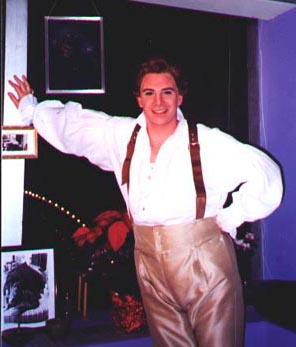
|
Terrence Mann as Chauvelin SP1 |


I met with Douglas in his dressing room before the December 11th performance. The entire interview is quite lengthy and appears in the "Spotlight On" section of Talkin' Broadway. Below are only a few excerpts ...

NR: OK. So, last year, after 20 years, you made it to Broadway ... and not in the ensemble but in the lead. Was the reality anything like the perception?
DS: It's more challenging even than I'd hoped it would be. I use everything I've ever learned. There's like a child stuck in a well and you dig with everything you've ever learned to get the child out. That's pretty much how it feels.
NR: I'd like to go through the first year. Real quick, just tell me what these felt like to you. The first opening.
DS: It was very exciting. I was ready for it. I had been preparing for it all my life. No one was asking me to do anything I couldn't do. There was a LOT of pressure - both self-imposed and super-imposed. There was a lot of money on the show.
NR: The Tony Awards
DS: Frustrating. There's SO much activity going on before the Tony Awards. SO much is demanded of you in terms of publicity and appearances that the idea that you're trying to concurrently play the lead in a play which is more strenuous than any single person should undergo in an of itself, and on top of that you should look great and appear at these things and be charming and interesting and available - it's very hard. So, it was not particularly enjoyable. It was chaos.
It was very disappointing to be honest with you. I don't know why but I had allowed myself, despite all predictions, to think what if, what if. I don't see how you can't if you're human. But it was really a pleasure to share the stage with other really strong shows in a really strong season, when audiences felt so strongly about the other performances and the other shows. The big thrill I think for me was having my parents be alive to be able to be there.
NR: Then you were on the verge of closing and Cablevision came to the rescue. How did you feel about that?
DS: I was tired. I wanted to go home. Because of this incredible opportunity I had been given, I felt it necessary to do everything I could for the piece and for those who were devoted to the piece. And I did. I literally spent my entire life. I forsaked my existence for the show - including my health. And, that was voluntary. And I'm not sorry I did it. But, it definitely aged me - no question about it. So, I was ready to go and when Teddy Forstmann came to me and said he was interested in having me stay, I said, "Teddy, I've got to be honest with you, I'm not. I've done it now - for my art and for my career. There's nothing left for me here. So, I'm flattered. But, you're going to have to come up with a reason for me to stay 'cause I can't." So, we came up with a reason for me to stay.
NR: OK, we'll get back to that. Tell me about October 1st (the last performance of the old show). What did that feel like?
DS: Oh ... like a rushed wake. You know, you need a mourning time and we didn't have it. Exciting, scary, overdue. I'm sure glad we had a closing night event. It was sad. I miss things from that show, very much. Regardless of what anyone says, the empirical truth is that the success that we enjoy today is inexorably linked to that show. And I mean EVERYTHING. Even the things that are no longer in the show, that have better things in their place, have arrived with those better things BECAUSE of what was there before. I've heard people say, "Oh, there was no other show. This is the beginning." That is not my feeling about it.
At this point, we were joined by Douglas' dresser, Jennifer Griggs, and his hairdresser, Alyce Banny. Later in the interview he directed some of my questions to the two of them.
NR: Let's talk about the ad libs from the first show. I'm trying to picture how this worked. You're the "new kid on the block" and here's Terrence Mann, "Broadway legend" and suddenly you're throwing him surprise lines that make him laugh.
DS: They weren't surprise because Terry and I work the same way. We knew that we both came from the same school of training.
NR: But, when did you think of them? On stage, in the shower in the morning, while you were frozen on the pedestal during "When I Look at You?"
DS: Nothing was ever, ever thought of before the moment occurred.
NR: Isn't that dangerous? Couldn't you suddenly say something you didn't mean to say?
DS: What else is there? What are you buying a ticket to see? Danger. That's what you people that are coming back more than once want to see. Is Douglas going to fall on his face? Yeah, it's dangerous. I think that's the whole point. I think that's why I'm doing it and I think that's why people came to see it.
Yeah, it's dangerous, but you can't do it without the implicit or at least spoken understanding of the other players. And Terry was amenable. That tonality was established in rehearsals.
Website Copyright Policy